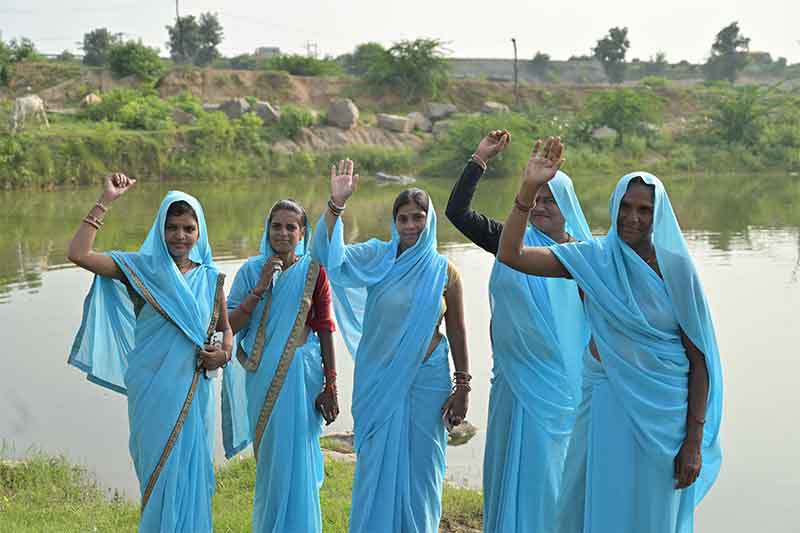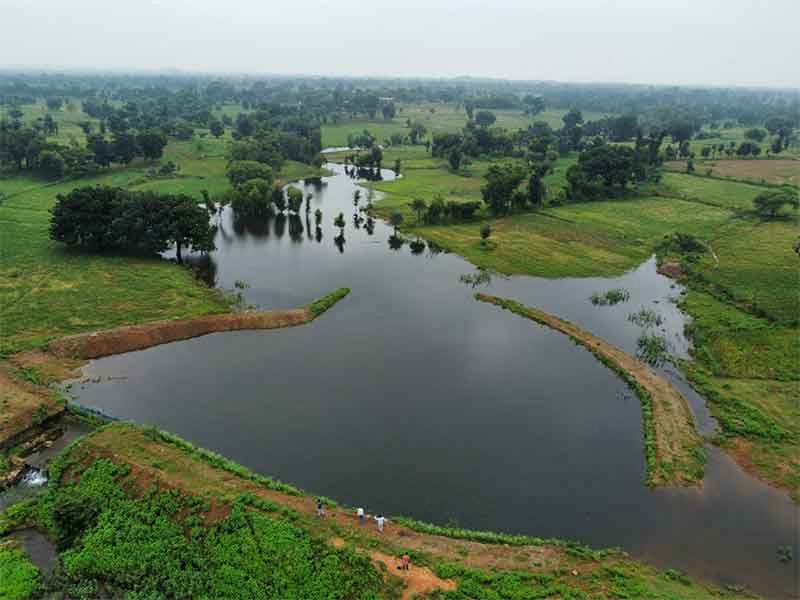
Traditional water sources like tanks and ponds have played a very important source in meeting water needs of villages in India, but partly because of the increased spread of piped water supply and partly because of the weakening of community efforts to maintain traditional water sources, silt and dirt have accumulated in several of these water sources and there is a proliferation of several aquatic weeds. This is very visible in several villages of Bundelkhand region in central India, despite the fact that these traditional sources of water have played a very important role in meeting the water needs of this region. In these conditions it is highly encouraging that rural women volunteers called jal sahelis have increasingly taken up the task of cleaning these water sources, the latest example of which was seen recently in the scorching hot conditions of mid-June in the voluntary work contributed by them to clean Mansarovar tank of Talbehat town.
The efforts of jal sahelis are linked closely to the water conservation efforts of a voluntary organization Parmarth whose water conservation work has attracted a lot of attention. Gaurav Pandey, a senior member of the Parmarth team says, “What we have seen more recently is that even when formally a program for cleaning a water source has not been decided, jal sahelis somehow find a few hours of time from other programs to devote to this. Seeing their devotion to this work, other people also join the effort so that much more gets done and local people also feel inspired to continue the work later.”
In Chaudhri Khera village of Chhattarpur district a water tank had fallen into disuse due to some prevailing superstitions relating to this. A woman volunteer named Ganga challenged this belief and gathered together several friends to de-silt and clean the tank. They even constructed a temporary bund on a rivulet to fill up the tank. This convinced the entire village to discard the superstition and give attention to properly maintaining the tank.
In the same district there have been several other efforts to de-silt and clean tanks with the help of jal sahelis, including tanks like Siwaha, Mankani, Dhardati, Katora and Badera. In Kirri cleaning and repair of very old water sources of historical importance was taken up.
In addition jal sahelis have also been active in the cleaning of several small rivers and rivulets which play an important role in meeting water needs of several villages but frequently suffer from neglect.
Naina river is an important tributary of Jamni river. People’s life in villages of about 17 panchayats is closely related to the proper flow of this river and the recharge of wells and other water sources provided by this flow. Due to several factors the flow of this river had been adversely affected in recent years. To check this deterioration, jal sahelis and other activists of Parmarth mobilized the people of several villages like Bahera and Naampura to take up cleaning and de-silting work in the river on voluntary basis. In Bahera village, for example, there have been two such mobilizations. In Naampura such an effort is to be appreciated even more because people came forward despite some serious problems in the village.
Ghurari river is an important tributary of Betwa river. Here
a big mobilization took place for clearing aquatic weeds. These were impeding the river flow and becoming a serious risk for fish and other river-life. Jal Sahelis came here for several days to clear weeds, contributing voluntary work from morning to evening in very difficult conditions, an effort which attracted a lot of attention.
To facilitate better use of waste water flowing from kitchens and bathing places, jal sahelis in some villages have been promoting kitchen gardens, in the process also adding to the nutrition of several households.
Jal Sahelis have also been active in village sanitation campaigns. Some of them like Sarkunwar played a very important role in arranging for the construction of toilets for those households which had been left out for some reason or the other in the earlier official campaign for this.
Subscribe to Our Newsletter
Get the latest CounterCurrents updates delivered straight to your inbox.
Bharat Dogra is Honorary Convener, Campaign to Save Earth Now. His recent books include Man over Machine, Protecting Earth for Children and India’s Quest for Sustainable Farming and Healthy Food.
















































